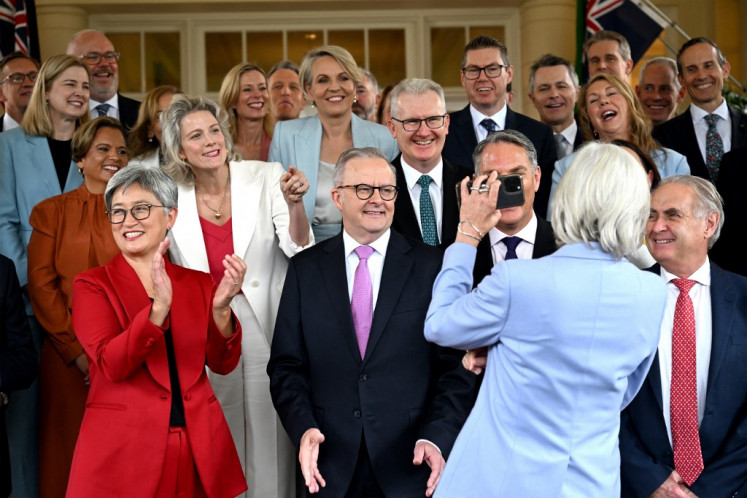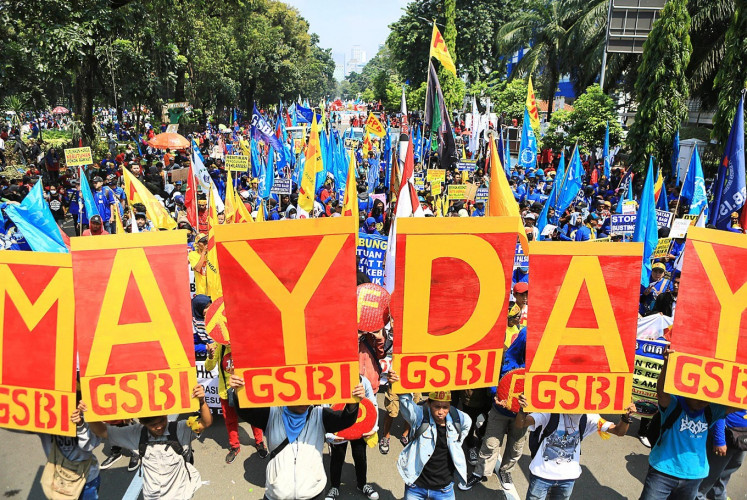Sjahrir proposed as `Father of Indonesian Diplomacy'
A committee on the centenary of national hero Sutan Sjahrir, the country's first prime minister, has urged the government to name him the Father of Indonesian Diplomacy for his role in gathering international support to acknowledge the country's independence declaration
Change text size
Gift Premium Articles
to Anyone

A
committee on the centenary of national hero Sutan Sjahrir, the country's first prime minister, has urged the government to name him the Father of Indonesian Diplomacy for his role in gathering international support to acknowledge the country's independence declaration.
The committee made the proposal in Cirebon, West Java, on Tuesday.
"Without the international diplomatic steps initiated by Bung *big brother* Sjahrir, it would have been difficult to gain worldwide acknowledgement," said committee head Yoyon Suharyono.
"Everybody knows Indonesia's independence was proclaimed by Bung Karno and Bung Hatta, but Bung Sjahrir was the one who strengthened the legitimacy of the proclamation internationally. They were the trinity who should have received extraordinary appreciation from this nation," he add-ed, referring to Indonesia's first president and vice president, Soekarno and Muhammad Hatta, respectively.
Besides galvanizing international support, Yoyon went on, Sjahrir also constituted one of the figures who laid the cornerstone for Indonesia's modern diplomacy. He was at the same time the initiator of the country's foreign policy, which remains active without associating with any one bloc or major power.
"Sjahrir's activities in international diplomacy have been used as a reference for Indonesia's foreign policy to this very day. What he did for our foreign policy is one of the reasons why Indonesia is well respected on the international stage," he said.
One of Sjahrir's most notable achievements was to deliver a speech at the United Nations' Security Council meeting on Aug. 14, 1947.
"In that forum, Bung Sjahrir told the world about Indonesia's sovereignty as a free nation," Yoyon said.
Sjahrir's struggle in international diplomacy for the acknowledgement of Indonesian sovereignty also inspired other developing countries in Asia and Africa to free themselves from colonialism, he added.
"Together with Bung Karno and Bung Hatta, what Bung Sjahrir did inspired Asian and African countries to struggle for their freedom."
He also said that besides recognizing Sjahrir for his contributions to the country, the proposal to name him the Father of Indonesian Diplomacy was also intended to prove that Indonesia used to have a prominent diplomat who was well respected on the international stage.
The proposal, Yoyon went on, was intended to bring Sjahrir's name back into the Indonesian people's collective memory.
"Many Indonesians don't know the role Bung Sjahrir played for Indonesia. The proposal is expected to remind us of one of Indonesia's best sons, who contributed greatly toward the establishment of a sovereign Indonesia," he said.
Sjahrir was born in Bukittinggi, West Sumatra, on March 5, 1909, and died in Zurich, Switzerland, on April 9, 1966, where he was taken for medical treatment. He was buried in the Kalibata heroes' cemetery in Jakarta.
Sjahrir was renowned for being active in Indonesia's independence struggle. At the age of 19, he was involved in the declaration of the Youth Pledge Day on Oct. 28, 1928.
At the age of 36, Sjahrir was appointed Indonesia's first prime minister. On Nov. 19, 1945, he established the Socialist People's Party in Cirebon.









